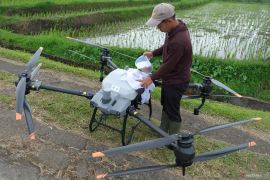The LOI, signed in Jakarta on Tuesday, was a starting point that would hopefully be followed up with concrete works, BRIN's Deputy of Research and Utilization of Innovation R.Hendrian said.
Satellites and their technologies are undoubtedly needed by such archipelagic states as Indonesia, he said.
Regarding the LOI for cooperation with Japan, BRIN's Head of Research Organization for Electronics and Informatics Budi Prawara said Japan's Quasi-Zenith Satellite System (QZSS) could potentially be utilized.
Due to its high precision, this Japanese satellite positioning system could be utilized for supporting the system development of autonomous electric vehicles and smart buoys that BRIN has been developing, he said.
Every autonomous vehicle which moves from one destination to another must be guided by a navigation system based on global positioning system (GPS) satellite to enable it to navigate with a minimum risk of collision.
"It is so good for the self-driving car navigation system that has become one of our research organization's focuses," Prawara said, adding that BRIN has planned to hold a workshop on satellite navigation systems and technologies.
To this end, several Japanese experts would be invited to share views and knowledge at the workshop that would become a transfer of knowledge with participants who are conducting research projects on building satellite navigation receivers, he said.
As published in the QZSS's official website, QZSS, also known as Michibiki in Japan is "composed mainly of satellites in quasi-zenith orbits (QZO)". It has been operated as a four-satellite constellation from November 2018.
Three of the satellites are visible at all times from locations in the Asia-Oceania region.
Thanks to its high compatibility, it can be used with GPS in an integrated way. Therefore, if the United States of America has Global Positioning System (GPS), the QZSS is sometimes called the "Japanese GPS".
QZSS informs that it contributes to "strengthening industrial competitiveness and to modernizing and effectuating operations of industries, lifestyle and administration of public organizations".
According to QZSS, it also provides regional positional services for Japan's greater presence in the Asia Pacific region, for the national security in connection with Japan and US cooperation, and for disaster mitigation capabilities.
Related news: Surya Satellite-1 to be launched from Japan in Oct
Related news: Indonesia renews cooperation on research with Japan
Related news: People’s mobility between ASEAN, Japan relatively low: BRIN
Translator: Sugiharto P, Rahmad Nasution
Editor: Sri Haryati
Copyright © ANTARA 2023












